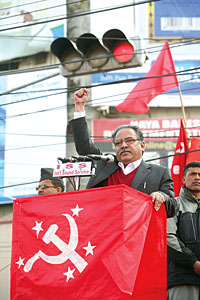 KIRAN PANDAY |
As Prachanda walked up to the stage in Naya Baneswor on Tuesday, he surveyed the crowd - rough estimates suggest there were more than 20,000 people - and smiled broadly.
In their subsequent speeches, both Prachanda and Dr Bhattarai reveled in this show of strength. "We wondered if the masses here are just our activists or ordinary citizens. If it includes the common people, our opponents should get the message. But if they are just our cadre, is there any other party that has such a large number of activists in the capital?" The crowd roared with approval.
The protest rally - organised within a day - was a measure of Maoist organisational strength, discipline, and ability to channel the energy of the crowds. Compare this to the NC and UML, who have not had a single mass meeting in Kathmandu to counter Maoist propaganda in the last eight months.
This fact of Maoist strength and their need to maintain it is crucial in understanding why Prachanda said what he said, and its potential implications.
Prachanda's first priority is to maintain his primacy within the party. He knows it is this massive organisational apparatus and his control over it that gives him power. He will feel the pulse of the party cadre, and judge what he needs to do to keep the majority of the other leaders on his side. With three rounds of agitation not delivering results, there was restlessness. Kiran and company, who want to scuttle any deal that would 'betray the revolution', were eager to raise the stakes. Prachanda decided he had to play along.
So why did he zero in on India?
Firstly, there is an element of truth in what was said. The trust deficit between Delhi and the Maoists is the single most important reason for the present impasse. But Prachanda's list of five bilateral issues is hogwash - the India-Maoist relationship did not go sour because of Kalapani or Susta, nor will it blossom with the resolution of those issues. But his point about there being no solution without a deal with India is spot-on. The rest of the political class and the mainstream media are angry with him for blowing the cover on the fiction of independence the Kathmandu establishment has assiduously cultivated. Nepal has been and remains only a partly sovereign country. Going public only reveals that private India-Maoist talks are going nowhere, and that the Maoists feel India is out to squash them.
The second reason is that Maoists can sense that there is increasing resentment against India on the streets of Nepal.
They calculate that land issues will win over the dispossessed rural peasantry and Dalits; the ethnic card will win over a broad-based segment from the marginalised elite to the semi-educated youth in district headquarters and smaller towns; but it is the anti-India card that will win them the support of the Kathmandu hill-origin youth, the lower middle class as well as the older royalist conservative constituency. By projecting the Madhesi parties as having sold out to Kathmandu because of pressure from Delhi, they even hope to generate support in the Tarai.
The third reason is that the only way Prachanda can create space for himself within the party to deliver on any promises to the NC-UML or internationals is by sounding radical in public.
Why else would he end the House obstruction a day after his fiery speech? The Maoists even agreed to discharge the disqualified from cantonments before the third phase of their agitationspeaked. One part of the Maoist strategy is to prepare for a confrontation, communicate with multiple constituencies, paint India-President-Army-PM as the pantheon of villains, and flag up the possibility of a right-wing takeover. But they will also cooperate and keep doors open for a compromise. Both strategies go together, and by publicising the first, the leadership defuses pressure from the hardliners and creates space to work on the second. What is certain is that Prachanda's public stance will not win him friends in Delhi. There is a sense in the Indian establishment that Prachanda has failed to be a mature leader once again, and succumbed to the hardliners - proving the Maoists cannot be trusted.
Prachanda's nuanced analysis may have been partially correct. But it is unhelpful in resolving the present impasse and could descend to mindless bigotry on the streets.
READ ALSO:
Dealing with Delhi, Editorial - FROM ISSUE #482 (25 DEC 2009 - 31 DEC 2009)
Parliament to resume - FROM 18 DEC 2009
Maoists want talks with Delhi - FROM 18 DEC 2009
End on a high - FROM 25 DEC 2009



